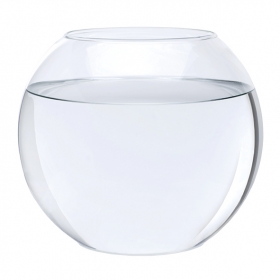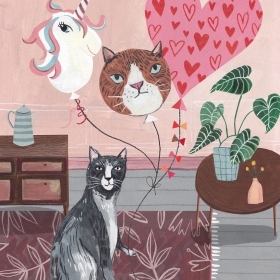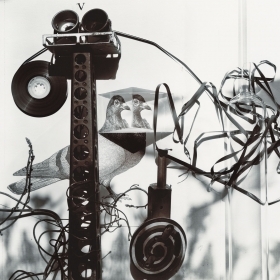When I was a kid, I wanted pets as substitute friends. I loved my dogs and turtles, fish and birds, because they loved me, kept me company, were always there for me. But as I’ve gotten older, I’ve realized that animals helped me find my people.

My first year at Wellesley, I had a pet betta fish. She was purple (to match my class color), and she lived in a small plastic tank on the top of my tall, honey-oak dresser in Claflin 107, alongside my two roommates and me. Her name was Wanda.
That first year, I experienced many life milestones: I lived away from my parents for the first time, I had the cartilage on my left ear pierced, I got in trouble for underage drinking in a dorm kitchen, I tried and loved guacamole. Wanda was a milestone, too—she was the first pet I’d had that I didn’t have to negotiate for. My mom is violently allergic to dust, mold, pollen, and anything with fur, feathers, or hair. Therefore, I spent my childhood aggressively researching different allergy-friendly animals and arguing the merits of each in pathetic, pleading letters I would leave on my mom’s pillow. I grew up an almost-only child, with three half-siblings a decade my senior, no cousins my age, in a neighborhood of older people. I went to a small Montessori school in my town where there were only three (three!) other girls my age in my class. I was desperate for companionship, and since I wasn’t finding many eligible humans, I turned to animals. I wore my mom down eventually, and I grew up with a menagerie of fish, birds, turtles, and dogs. But my first year at Wellesley, I found myself living away from home and petless, so when I learned that dorm policy allowed fish, I immediately got my friend to drive me to PetSmart on Route 9, and I came home with Wanda. I didn’t have to ask my mom. I didn’t have to ask anyone. I just went and got a fish. It was more exhilarating than the cartilage piercing.
While Wanda was clearly my pet—I was in charge of feeding her, cleaning her tank—my roommates also enjoyed her presence. In our housing-office-assigned triple, in a room maybe not originally designed to hold three beds, things could get tense, but Wanda smoothed things over. She was the one thing we could always talk and joke about, have in common. Other Claflin residents started to notice my betta, too, and they’d ask about the fish and come over to visit her. People were drawn to Wanda.
But Wanda was not long for this world. One night, I didn’t feel like buying a bottle of Poland Spring Water from the vending machine in the dorm basement; I used unfiltered water from the Claflin kitchen instead. A couple of days later, Wanda started to look puffy, and my then-premed roommate (who also had an interest in marine biology) diagnosed poor Wanda with dropsy, usually caused by an infection. There was no cure. My roommate suggested we try a humane method of euthanasia: suffocating the fish with grain alcohol.
Of course, I had no liquor as I was not yet 21 (I had learned my lesson), but some of the older dorm residents did, and so, one night, in the Claflin first-floor kitchen, my two roommates, several other Claflinites, and even a buddy who came all the way from the new dorms (they were so far away) gathered to send Wanda off. I slipped the pinecone-shaped purple betta from a cup of water into a cup of, ironically, Poland Spring vodka. Suddenly, all dropsy-induced lethargy gone, Wanda flipped, her small body spun with ferocious strength, splashing at the surface of the vodka. We watched as the fish snapped like a flag in a hurricane. She twisted from side to side, her mouth opening and closing in a perfect circle. One final shiver, and Wanda was still.
My heart sank. The fish that had bonded me with my roommates, that made friends in the dorm, even across campus, was gone. Would they even want to hang out with me now? But then I felt a hand on my shoulder, and another on my back. I looked up from the vodka and dead fish and saw the Claflin kitchen was still full of my friends. I was sad that Wanda was gone, but look at what she left me.
When I was a kid, I wanted pets as substitute friends. I loved my dogs and turtles, fish and birds, because they loved me, kept me company, were always there for me. But as I’ve gotten older—even though I still love having pets—I’ve realized that animals helped me find my people. Now I am writing a book about the different ways that people mourn and remember their pets after they die—inspired by Wanda and my other childhood pets. And while this book is obviously about the animals we love, it’s also about the people we find on the way, who love animals as much as we do, and who are there for us afterward, when those animals die and we are left alone in a dorm kitchen. The roommate who diagnosed the dropsy is still one of my best friends, and, a decade later, we still remember the puffy purple fish in Claflin 107.
E.B. Bartels—who shares her Cambridge, Mass., home with a tortoise named Terrence—is the author of Good Grief: On Loving Pets Here and Hereafter, a narrative nonfiction book about the ways we mourn and remember our pets after they die, to be published by Houghton Mifflin Harcourt in 2021.


